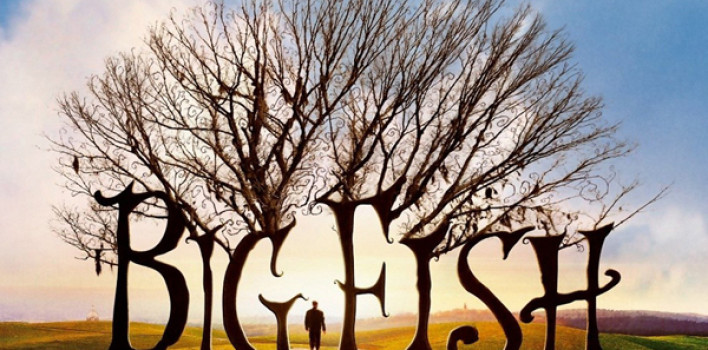Review| Big Fish: The Best Tales Are The Tall Ones
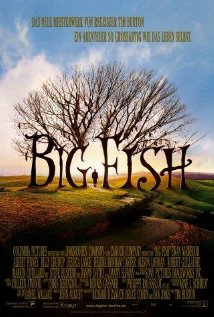 Inside the hardened exterior of every tough guy lies a soft spot that rarely, if ever, comes out. For many men this soft spot is revealed at the birth of their first child, the giving away of their daughter in marriage, or any number of life’s precious or tragic moments. For others, like myself, there are certain movies that bring it out like nothing else can. Big Fish is one of my “big softy” movies, and I imagine I’m not alone.
Inside the hardened exterior of every tough guy lies a soft spot that rarely, if ever, comes out. For many men this soft spot is revealed at the birth of their first child, the giving away of their daughter in marriage, or any number of life’s precious or tragic moments. For others, like myself, there are certain movies that bring it out like nothing else can. Big Fish is one of my “big softy” movies, and I imagine I’m not alone.
Big Fish is a 2003 Tim Burton release starring Albert Finney as an aged Edward Bloom, and Ewan McGregor as young Edward Bloom seen primarily in flashbacks. The two are cast well in these roles and tell their stories in a narrating fashion. They do so with an unmistakable southern twang, Edward being from Alabama. It’s funny how different dialects of a language bring about certain feelings. When I hear a British accent, I assume the person is a genius! With a southern drawl I envision a straight-shooting, hard truth, give you the shirt off their back kind of person. Throw in some legendary tales and that’s not far off from the character we find in Edward Bloom.
At the time this film was released Ewan McGregor is coming into stardom, having just done two of the latest installments of Star Wars as well as Black Hawk Down. And Albert Finney, had it not been for the likes of Morgan Freeman, Liam Neeson and James Earl Jones, might be the most recognizable narrating voice of our time. I think these two actors provide solid bookends to the story of Edward Bloom. Each thrive in what they’re given to do, which has very different demands both physically and emotionally. There is a strong father-son struggle which the elder Bloom (Finney) must walk through that the younger Bloom (McGregor) is not exposed to. We’re also asked to believe that the elder Bloom, who is confined to a bed for most of the film, was once a strapping, athletic, physically capable young man. Each actor contributes well to the overall image we develop of Edward Bloom.
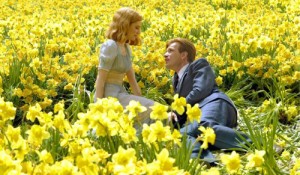 Big Fish is a story about fantastic stories. The kind your dad or grandfather may have told which you are somehow forced to ask the very question which necessitates the telling of an amazing tale. The kind of stories which must begin with, “ya know, when I was your age…”. We are given a heavy dose of reminiscence in Big Fish, and there is just enough nostalgia mixed into it without over-doing it. Wonderful attempts are made to convey these stories as a child might hear them for the first time and make the viewer completely forget about the backdrop of the movie and the reason these stories are being re-visited.
Big Fish is a story about fantastic stories. The kind your dad or grandfather may have told which you are somehow forced to ask the very question which necessitates the telling of an amazing tale. The kind of stories which must begin with, “ya know, when I was your age…”. We are given a heavy dose of reminiscence in Big Fish, and there is just enough nostalgia mixed into it without over-doing it. Wonderful attempts are made to convey these stories as a child might hear them for the first time and make the viewer completely forget about the backdrop of the movie and the reason these stories are being re-visited.
Having not come to faith in Jesus until I was 22 and in college, I missed out on hearing many of the Bible’s great stories when I was a child. My adult mind tries to examine what God is really saying in these stories and what principles I might apply to my life. I often miss the opportunity to just soak it in and appreciate the purely awesome God that we have, as a child would. Being aware of that fact helps me appreciate even more what Jesus said regarding the kingdom of God: whoever does not receive the kingdom of God like a child will not enter it at all (Lk. 18:17). I take this to be a reference to the innocence and uncompromising love of a child. Children love from a place of wonder, awe and excitement. They don’t consider logical conclusions or testability. They just love. Big Fish accomplishes the task of putting my mind in a state of wonder when the stories are told so it’s as though I’m hearing them anew every time and appreciating them for their majesty, not whether they make sense contextually or realistically.
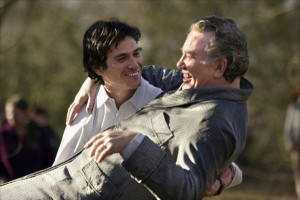 Billy Crudup (Watchmen, The Good Shepherd) also stars in this film as Will Bloom, only son of Edward Bloom. Will and Edward have a falling out early in the film and are only brought together again by the news of Edward’s failing health. Upon thinking back on the stories his father has told him growing up, Will realizes he doesn’t actually know who his father is. How many of these incredible stories about this man are true? Is this image that he has created of his father actually real? This is quite a sad revelation, but it is exactly the thing I forgot about when Edward begins telling of another fantastic adventure of days gone by. I think that is precisely what Burton was going for. Reminding us of how great stories have the pleasant ability to distract us, if only for a short time, from some of the harsh realities of life.
Billy Crudup (Watchmen, The Good Shepherd) also stars in this film as Will Bloom, only son of Edward Bloom. Will and Edward have a falling out early in the film and are only brought together again by the news of Edward’s failing health. Upon thinking back on the stories his father has told him growing up, Will realizes he doesn’t actually know who his father is. How many of these incredible stories about this man are true? Is this image that he has created of his father actually real? This is quite a sad revelation, but it is exactly the thing I forgot about when Edward begins telling of another fantastic adventure of days gone by. I think that is precisely what Burton was going for. Reminding us of how great stories have the pleasant ability to distract us, if only for a short time, from some of the harsh realities of life.
The battle through most of the film is that Will Bloom does not see his father as a great story teller or a warm and charming man as everyone else seems to. To Will, his father is a liar who never reveals his true self and has somehow convinced everybody that it’s okay because hey, everyone loves a good story. In one confrontation, Will tells his father that he hasn’t been honest with him, he hasn’t been real, hasn’t been himself. “I’ve been nothin’ but myself since the day I was born, and if you can’t see that it’s your failin’, not mine”, Edward stoutly replies. Even when confronted with the obvious invention of specific events in his life, Edward still insists that he can only be who he is. Edward and Will’s relationship is strained and full of distrust. There’s a great line from Fight Club where Tyler Durdin says, “Our fathers were our models for God. If our fathers bailed, what does that tell you about God?”. That’s a hard pill to swallow. Whether it be bailing all-together, or building a false image of yourself and grandiose expectations of your son, a father’s impact on their son can be immeasurably good or bad. As a father myself, it’s easy to lose track of this fact in the day-to-day, but it is something which deserves to be kept at the forefront of our minds. There are many ways that fathers can “provoke your children to anger” (Eph. 6:4). I think that abandonment is certainly one of those ways.
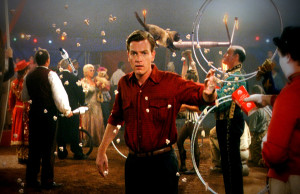 There is one line in particular from this film that I adore. To serve as a lead-in to yet another incredible tale, Edward Bloom says, “There’s a time when a man needs to fight, and a time when he needs to accept that his destiny is lost, the ship has sailed and only a fool would continue. Truth is… I’ve always been a fool.” I read the book Wild at Heart a few years ago and it really resonated with me. That book, along with this quote, really touch on the premise that men greatly desire for that fighter side in them to come out. Or just be given an opportunity to come out! I’m not talking about picking fights with people, I’m talking about the chance to stand up for what’s right. To have some righteous indignation delivered upon the unjust at your hands! Okay, maybe that’s a bit overboard. But in an age when God is most popularly described as love and compassion (which of course He is), we forget that God is also a warrior (Exodus 15:3), that He is mighty (Job 36:5) and His Word is as a two-edged sword (Hebrews 4:12). The warrior spirit in many men is often told to calm down, sit still, stay in line, mind your manners and don’t rock the boat. We would do well to listen to that God-given spirit embedded in us and mind Edward’s words… there’s a time when a man needs to fight.
There is one line in particular from this film that I adore. To serve as a lead-in to yet another incredible tale, Edward Bloom says, “There’s a time when a man needs to fight, and a time when he needs to accept that his destiny is lost, the ship has sailed and only a fool would continue. Truth is… I’ve always been a fool.” I read the book Wild at Heart a few years ago and it really resonated with me. That book, along with this quote, really touch on the premise that men greatly desire for that fighter side in them to come out. Or just be given an opportunity to come out! I’m not talking about picking fights with people, I’m talking about the chance to stand up for what’s right. To have some righteous indignation delivered upon the unjust at your hands! Okay, maybe that’s a bit overboard. But in an age when God is most popularly described as love and compassion (which of course He is), we forget that God is also a warrior (Exodus 15:3), that He is mighty (Job 36:5) and His Word is as a two-edged sword (Hebrews 4:12). The warrior spirit in many men is often told to calm down, sit still, stay in line, mind your manners and don’t rock the boat. We would do well to listen to that God-given spirit embedded in us and mind Edward’s words… there’s a time when a man needs to fight.
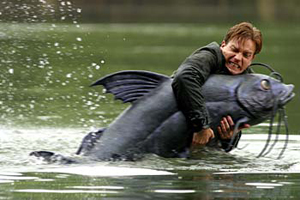 When I think of a fable I think of a story where far-fetched circumstances meet incredible people and result in unbelievable outcomes. That’s a pretty good description of Big Fish. Even the larger story being told, Will’s very real dealings with his dying father who insists on dwelling in his very unreal stories, has an amazing and heartfelt conclusion that is sure to tug at your heart. There are many other biblical or spiritual aspects to this film we could talk more extensively about: Forgiveness of wrongs done upon you, the healing power of restitution, loyalty to the one who you vowed your life to… I hope you’re able to key on many of these things and let them encourage you as this movie has me
When I think of a fable I think of a story where far-fetched circumstances meet incredible people and result in unbelievable outcomes. That’s a pretty good description of Big Fish. Even the larger story being told, Will’s very real dealings with his dying father who insists on dwelling in his very unreal stories, has an amazing and heartfelt conclusion that is sure to tug at your heart. There are many other biblical or spiritual aspects to this film we could talk more extensively about: Forgiveness of wrongs done upon you, the healing power of restitution, loyalty to the one who you vowed your life to… I hope you’re able to key on many of these things and let them encourage you as this movie has me


